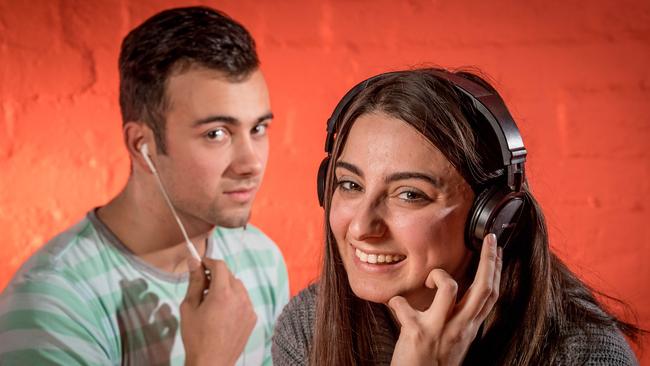Experts warn of hearing loss from playing music too loud and too long on smartphones
LISTEN up. Playing tunes on smartphones or other devices is a national obsession, but some of us have a bad habit that could cause permanent damage.
National
Don't miss out on the headlines from National. Followed categories will be added to My News.
CHILDREN as young as 15 are blasting their ears with dangerous levels of music played on smartphones and are risking hearing loss.
Amid an explosion of music streaming through devices, research has found 15 per cent of Australians regularly pump up the volume on their headphones too loud and/or listen for too long.
This is putting them at higher risk of irreversible noise-induced hearing damage later in life.
Some are playing tunes on personal listening devices, mainly smartphones, at maximum volume for several hours a day, the HEARing Cooperative Research Centre study revealed.
“Noise damage is accumulative. It can take many years before you realise and is so gradual and insidious that by the time you realise it can be too late to do anything about it,” co-author and research psychologist Dr Elizabeth Beach said.
Safety warning after headphones explode
Experts advise restricting sound to no more than 80 per cent of maximum volume. If played at that upper level, it should be for no more than 1 ½ hours a day.
“The rule of thumb is if you would have to raise your voice to have a conversation while listening with headphones it is too loud,” Dr Beach said.
Well-fitting headphones that cover the ears, rather than the small buds sold with smartphones, are recommended when in locations with background noise such as on public transport.

Sunny Bhasin, founder of fledging electronics brand SMATE, said prominent warning labels similar to those on tobacco products should be made compulsory with the sale of headphones.
Some devices alert users when volume is too loud. Cautions may also be in product manuals.
Dr Beach said playing at 80 per cent volume was equivalent to about 85 decibels, about the same sound level as a busy city street or vacuuming. Full volume was about 100 decibels, in line with noise at a live music concert.
The study, to be published in the Seminars in Hearing journal, quizzed 4185 people about their listening habits.
Those aged in their mid-20s reported the riskiest behaviour. Teens aged 15-19 had the longest listening time, averaging 22 hours a week.
Dr Beach said early signs of noise-induced hearing loss included straining to hear the television and radio, and hearing only mumbling when others spoke.
Regular blasts of too much noise could also lead to permanent ringing of the ears.
The World Health Organization is developing international standards for safe listening levels.
Originally published as Experts warn of hearing loss from playing music too loud and too long on smartphones


